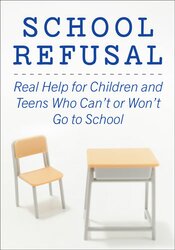
×

School refusal creates chaos in families and often becomes a vicious cycle in which students become trapped.
Often a symptom of anxiety and depression, school refusal creates an immediate short-term relief for kids seeking to escape aspects of the school day. But the result typically includes falling further behind academically, increased feelings of disconnection from peers, and lowered self-esteem.
Watch Susan Gibbs, LPC, to learn from her extensive experience in addressing school refusal effectively. She will bridge the clinical and educational words and share approaches for both environments so you can help struggling students and families.
You will finish with the ability to:
Purchase today to help students end the cycle of school refusal by changing the way they see themselves and the world around them.
All members of the PESI, Inc. planning committee have provided disclosures of financial relationships with ineligible organizations and any relevant non-financial relationships prior to planning content for this activity. None of the committee members had relevant financial relationships with ineligible companies or other potentially biasing relationships to disclose to learners. For speaker disclosures, please see the faculty biography.
NOTE: Tuition includes one free CE Certificate (participant will be able to print the certificate of completion after passing the online post-test (80% passing score) and completing the evaluation). Instructional methods will include PowerPoint, didactic lecture, and others.
Continuing Education Information: Listed below are the continuing education credit(s) currently available for this non-interactive self-study package. Program content is reviewed periodically per accrediting board rules for currency and appropriateness for credit. Credit approvals are subject to change. Please note, your licensing board dictates whether self-study is an acceptable form of continuing education, as well as which credit types are acceptable for continuing education hours. Please refer to your licensing board's rules and regulations. If your profession is not listed, please contact your licensing board to determine your continuing education requirements and check for reciprocal approval.
For other credit inquiries not specified below, please contact info@pesi.com or 800-844-8260 before purchase.
Materials that are included in this course may include interventions and modalities that are beyond the authorized practice of your profession. As a licensed professional, you are responsible for reviewing the scope of practice, including activities that are defined in law as beyond the boundaries of practice in accordance with and in compliance with your profession's standards.
For Planning Committee disclosures, please see the statement above. For speaker disclosures, please see the faculty biography.
Earn up to 6.25 CE hours. Please see below, for more details, as credit amounts vary by jurisdiction and profession.

PESI, Inc., #1062, is approved as an ACE provider to offer social work continuing education by the Association of Social Work Boards (ASWB) Approved Continuing Education (ACE) program. Regulatory boards are the final authority on courses accepted for continuing education credit. ACE provider approval period: January 27, 2023 - January 27, 2026. Social workers completing this course receive 6.25 Clinical continuing education credits.
Course Level: Intermediate Format: Recorded asynchronous distance. Full attendance is required; no partial credits will be offered for partial attendance.
Canadian Social Workers: Canadian provinces may accept activities approved by the ASWB for ongoing professional development.
This self-study activity qualifies for 6.25 continuing education clock hours as required by many national, state and local licensing boards and professional organizations. Save your activity advertisement and certificate of completion, and contact your own board or organization for specific requirements.
| File type | File name | Number of pages | |
|---|---|---|---|
| Manual - School Refusal (15.2 MB) | 84 Pages | Available after Purchase | |
| Text Document | Illinois Educators Self-Study Instructions (28.5 KB) | Available after Purchase | |
| Illinois Educators Evaluation Form (1.2 MB) | Available after Purchase | ||
| Manual - School Refusal - French (15.2 MB) | 84 Pages | Available after Purchase | |
| Manual - School Refusal - Italian (15.2 MB) | 84 Pages | Available after Purchase |

Susan Gibbs, MS, LPC
Dynamic Counseling
Susan holds a master’s in counseling and clinical health psychology, with 20 years of experience spanning community mental health, school, in-home, crisis and outpatient settings. Susan was the director of an acute short-term residential program for adults, program coordinator of Children’s Mobile Response, program coordinator of an alternative high school for students at risk of being placed out-of-district and has been the sole proprietor of her own private practice working with children, adolescents, families and adults since 2016. Additionally, she recently began instructing undergraduate psychology courses at Rowan College at Burlington County. She trains providers and parents as an advanced trainer for the Nurtured Heart Approach and has held certifications as a certified mental health screener and certified psychiatric rehabilitation practitioner in the past. With her experience in crisis, in-home counseling, and work in an alternative high school, she has specific experience and training in school refusal, relevant to school and home environments.
Speaker Disclosures:
Financial: Susan Gibbs maintains a private practice and has employment relationships with Rowan College and The Listening Center. She receives a speaking honorarium from PESI, Inc. She has no relevant financial relationship with ineligible organizations.
Non-financial: Susan Gibbs has no relevant non-financial relationships.
Access never expires for this product. For a more detailed outline that includes times or durations of time, if needed, please contact cepesi@pesi.com.
Visit our FAQ page at https://www.pesicanada.ca/faq or contact us at https://www.pesicanada.ca/contact-us.
The What and the Why of School Refusal
Simple dislike, truancy, or something else entirely?
School Avoidance: A Vicious Cycle
Short-term relief with long-term consequences
Grounding and Planning, Not Coping
Power through or enhance resilience?
The Nurtured Heart Approach®
Inspire behaviour vs manage behaviour
Engagement and Connectedness
Multi-tiered support and collaborative intervention
Limitations of the Research and Potential Risks
Satisfaction Guarantee
Your satisfaction is our goal and our guarantee. Concerns should be addressed to info@pesicanada.com.
Please wait ...